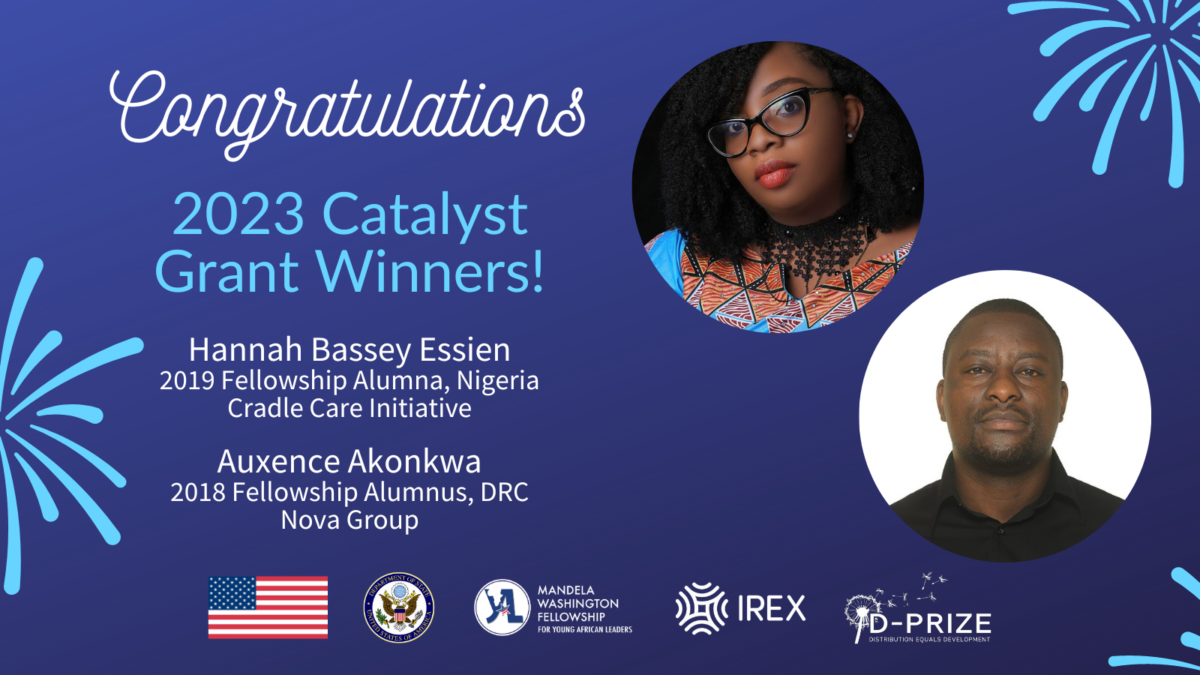
Since 2014, Mandela Washington Fellowship Alumni have been investing their time and livelihoods in tackling key challenges across Sub-Saharan Africa. That’s why, in 2021, the Fellowship launched the Catalyst Grant, which aims to address poverty challenges by scaling proven solutions and providing long-term benefits to communities and countries.
This year, the Fellowship is pleased to award two Catalyst Grants:
- Cradle Care Initiative, led by Hannah Bassey Essien, 2019 Fellowship Alumna from Nigeria, addressing the Immunizations Challenge
- Nova Group, led by Auxence Akonkwa, 2018 Fellowship Alumnus from the Democratic Republic of the Congo, addressing the Quality Inputs Challenge
These projects have the potential to help improve lives across the continent, and the Fellowship is proud to support them as they strive to find solutions to challenges in the communities they serve.
Saving Lives, One Vaccine at a Time
In the Odukapi community of Cross River State, Nigeria, only 8% of children between the ages of 12 and 24 months are fully immunized. The lack of immunizations makes children, and their families, vulnerable to preventable diseases and death, hurting the entire community.
Hannah Bassey Essien hopes to change that through her Cradle Care Initiative. With her colleagues and healthcare experts Florence Ansa Bassey and Goodness Ogeyi Odey, Hannah hopes to build on her years of experience in health awareness campaigns to advocate for vaccines, reduce preventable diseases, and improve livelihoods across their state. As a communication and media specialist, Hannah helped improve awareness of the rights of women across the region, helping support women who were victims of gender-based violence.
In the fight to improve immunization rates, Cradle Care Initiative is up against a variety of barriers: difficulties transporting vaccines and ensuring their efficacy, limited trained staff for both the healthcare and sensitization aspects of the campaign, and the prevalence of traditional medicine, which eschews vaccinations and often attributes preventable deaths to immunizations themselves. Nevertheless, Hannah hopes to empower women, as she has done before, with the information that they need to make informed decisions and prioritize their families’ well-being.
“Serving my community is key to my existence,” says Hannah. She hopes to reach all facets of the Cross River State community through this project, including refugees and internally displaced people in this region bordering Cameroon, and increase the immunization rate to 30% in the next five years. Higher rates of immunization, leading to lower incidence of disease, will help children and their families thrive, giving Hannah hope for a brighter future.
Achieving Social Justice through High-Quality Maize
As an agricultural value chain expert, Auxence Akonkwa is well-versed in the challenges facing farmers in the South-Kivu region of the Democratic Republic of the Congo (DRC): poor seeds and fertilizers, coupled with ineffective training in the industry, have led to low yields, resulting in low incomes and protracted challenges for many farmers’ families.
Auxence is convinced that strategic investments and training can change all of that. During his Professional Development Experience with the University of Georgia in Tifton, Georgia, he honed his skills and he has further strengthened them through his work in the DRC over the last five years.
Through his venture with the Nova Group, together with, Roger Zagabe, Aurelie Kamole, and Pascaline Andema, Auxence hopes to further leverage his expertise to support farmers and other beneficiaries underserved by traditional agricultural extension services.
By training farmers in best practices and increasing their access to quality seeds and fertilizers, Auxence hopes to improve their yields and increase their incomes. Additionally, he hopes to capitalize on their convenient distance to Lake Kivu, utilizing water transport to reduce the time it takes to bring maize to market and bypassing poor road infrastructure.
In five years, Auxence hopes to reach more than 120,000 beneficiaries. Improving yields would not only affect the farmers themselves but would rather help their entire families and communities: nutritional health, access to essential social services and education, and social dignity could all advance by leaps and bounds.
Investing in Scalable Solutions to End Poverty
Through the Catalyst Grant, the Mandela Washington Fellowship and D-Prize are proud to support the teams at Cradle Care Initiative and Nova Group. It is our hope that not only will they reach their goals, but that their solutions will be transferable to other communities and countries, contributing to solutions across Sub-Saharan Africa.
Congratulations to the Cradle Care Initiative and Nova Group teams – we can’t wait to see what you achieve through the Catalyst Grant.